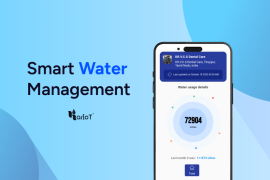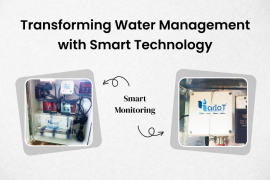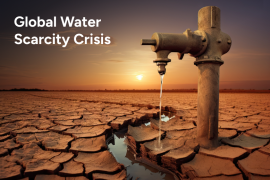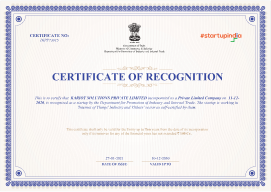Water is a fundamental resource that sustains life, ecosystems, and economies. However, the global water crisis poses a significant threat to this essential resource, with over 2 billion people lacking access to safe drinking water and the increasing strain from population growth, climate change, and pollution. Sustainable water management is critical in addressing these challenges. Furthermore, It involves adopting practices that conserve water, protect water quality, and ensure equitable access for all. By implementing effective strategies and staying ahead of future trends, we can secure water resources for current and future generations, fostering a more sustainable and resilient world.
Importance of Sustainable Water Management
Overview of the Global Water Crisis
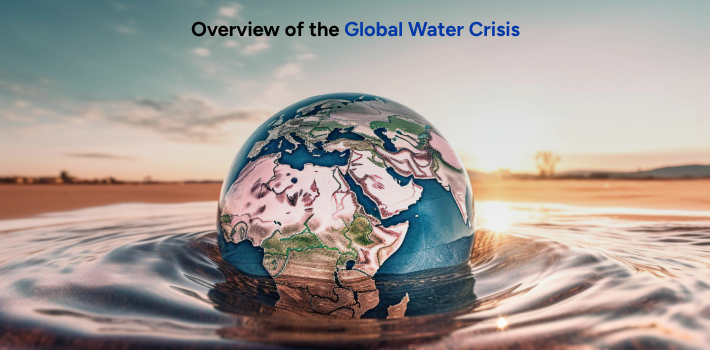
The global water crisis is a significant challenge, with over 2 billion people lacking access to safe drinking water. Factors such as population growth, climate change, pollution, and inefficient water use exacerbate the scarcity of clean, accessible water. Also by 2025, half of the world’s population may live in water-stressed areas. Addressing this crisis requires urgent action to implement sustainable water management practices and improve water infrastructure globally.
Importance of Conserving Water, Protecting Water Quality, and Ensuring Equitable Access
Conserving Water
Efficient water use helps ensure that water resources are available for future generations. Technologies like low-flow fixtures, drip irrigation, and water-efficient appliances can significantly reduce water wastage. According to the EPA, water-efficient practices can lower water use in buildings by 20% to 30%.
Protecting Water Quality
Maintaining clean water is vital for health and ecosystems. Pollution from industrial, agricultural, and domestic sources can degrade water quality, affecting both humans and wildlife. Also implementing pollution prevention practices and protecting natural water bodies and wetlands are essential for preserving water quality.
Ensuring Equitable Access
Equitable access to water is a fundamental human right. It ensures that all communities, especially vulnerable ones, have sufficient, safe, and affordable water for their needs. Policies and infrastructure improvements that support fair distribution are key to achieving this goal.
Introduction to Key Strategies and Future Trends in Sustainable Water Management
Key Strategies
By focusing on sustainability in water management, we can address the global water crisis, protect our environment, and consequently ensure a better future for all.
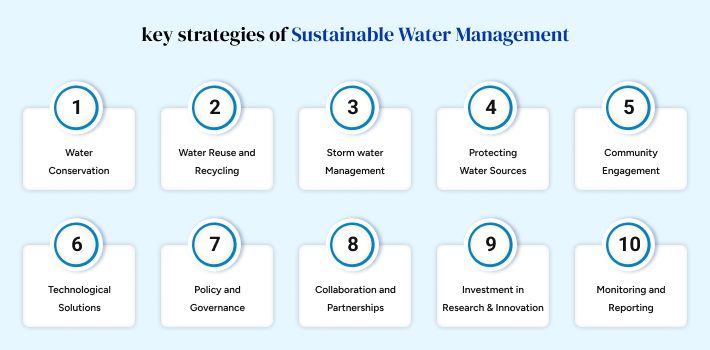
Water Conservation
Efficient water use is fundamental to sustainability. Technologies like low-flow fixtures, drip irrigation, and water-efficient appliances significantly reduce water consumption. Promoting awareness among communities and businesses about the importance of conserving water is essential.
Water Reuse and Recycling
Water reuse and recycling systems treat and repurpose wastewater for non-potable purposes like irrigation, industrial processes, and toilet flushing, thus reducing demand for freshwater sources.
Storm Water Management
Effective storm water management involves designing infrastructure to capture and manage storm water runoff, reducing pollution and replenishing groundwater.
Protecting Water Sources
Preserving natural water bodies, wetlands, and watersheds is vital for maintaining water quality and biodiversity. Additionally, Implementing policies and practices that prevent pollution from entering water sources is essential.
Community Engagement
Engaging communities in sustainable water practices is crucial. Specifically, educating and involving communities in initiatives like rainwater harvesting, community gardens using harvested rainwater, and educational programs in schools can drive significant change.
Technological Solutions
Technological advancements play a significant role in sustainable water management. Also, IoT-enabled sensors and smart water meters enable real-time monitoring and management of water systems, helping to identify leaks, optimize water use, and reduce wastage.
Policy and Governance
Advocating for and implementing policies that support sustainable water management practices is essential. Moreover, this includes regulatory frameworks, incentives for conservation, and integrated water resource management.
Collaboration and Partnerships
Collaboration among stakeholders, including government agencies, businesses, NGOs, and local communities, is crucial for addressing water management challenges and promoting sustainable solutions.
Investment in Research and Innovation
Supporting research into new technologies, methodologies, and best practices for sustainable water management is vital. Moreover, encouraging innovation in water treatment, desalination, and efficient irrigation systems can drive progress.
Monitoring and Reporting
Establishing robust monitoring systems to track water usage, quality, and conservation efforts is essential. Regular reporting also helps in assessing progress toward sustainability goals and identifying areas for improvement.
Future Trends and Statistics
By adopting these strategies, individuals, communities, businesses, and governments can contribute to sustainable water management, ensuring water security for current and future generations.
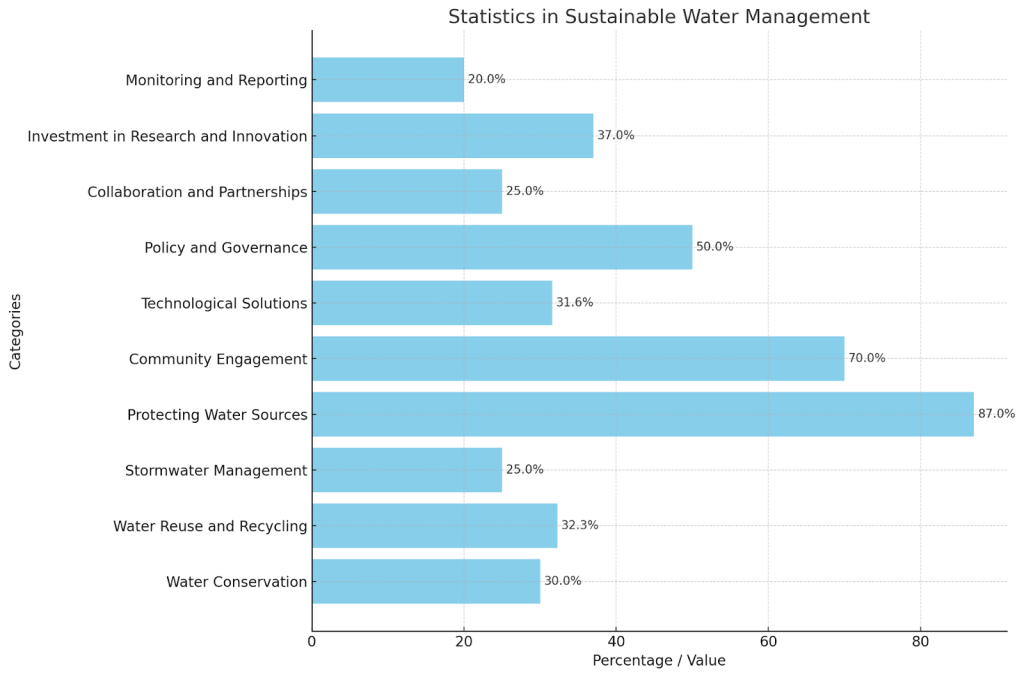
Here is a bar chart illustrating key statistics in sustainable water management. Each category represents a specific strategy or area of focus, with the corresponding percentage or value highlighted:
These statistics underscore the importance and impact of various sustainable water management practices.
In conclusion
Sustainable water management is essential for preserving the availability and quality of water resources for everyone. Consequently, Key strategies include water conservation, reuse, storm water management, protecting water sources, community engagement, technological solutions, policy and governance, collaboration, investment in research, and robust monitoring. These efforts can significantly address the global water crisis.
Future trends, such as the growing use of smart technologies and climate resilience strategies, underscore the need for proactive measures. By embracing sustainability in water management, we can protect our environment, support human health, and ensure equitable access to water for future generations.




